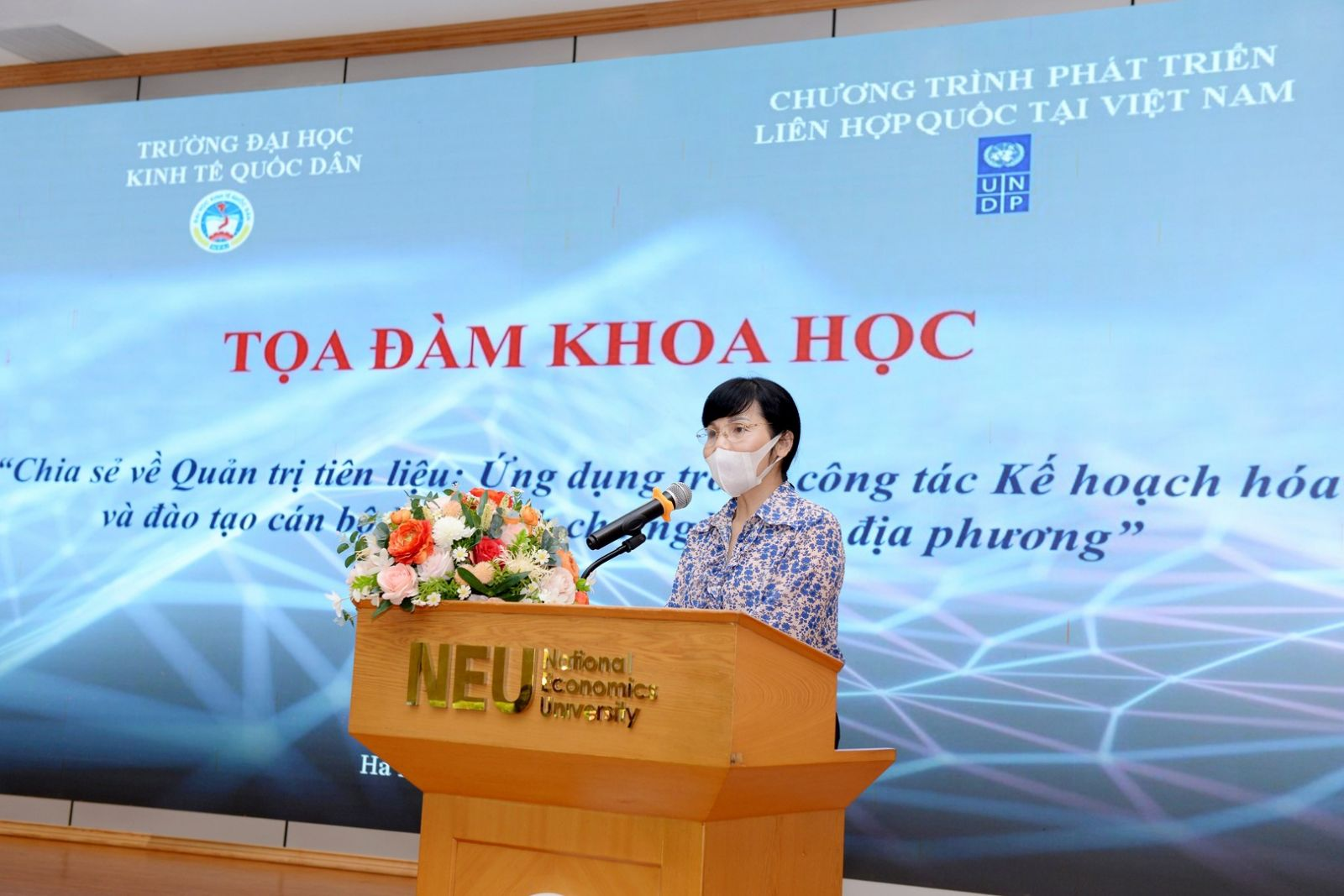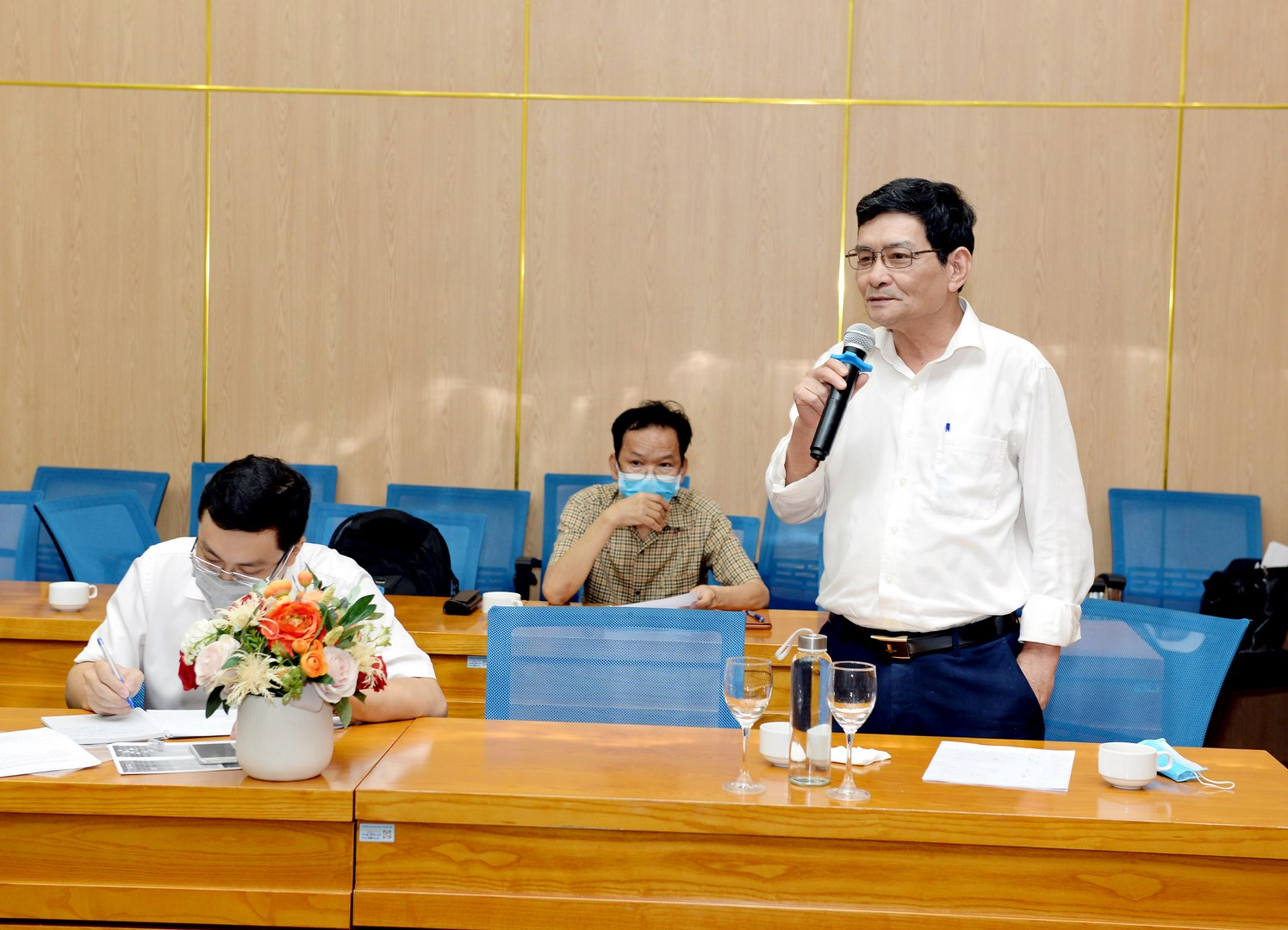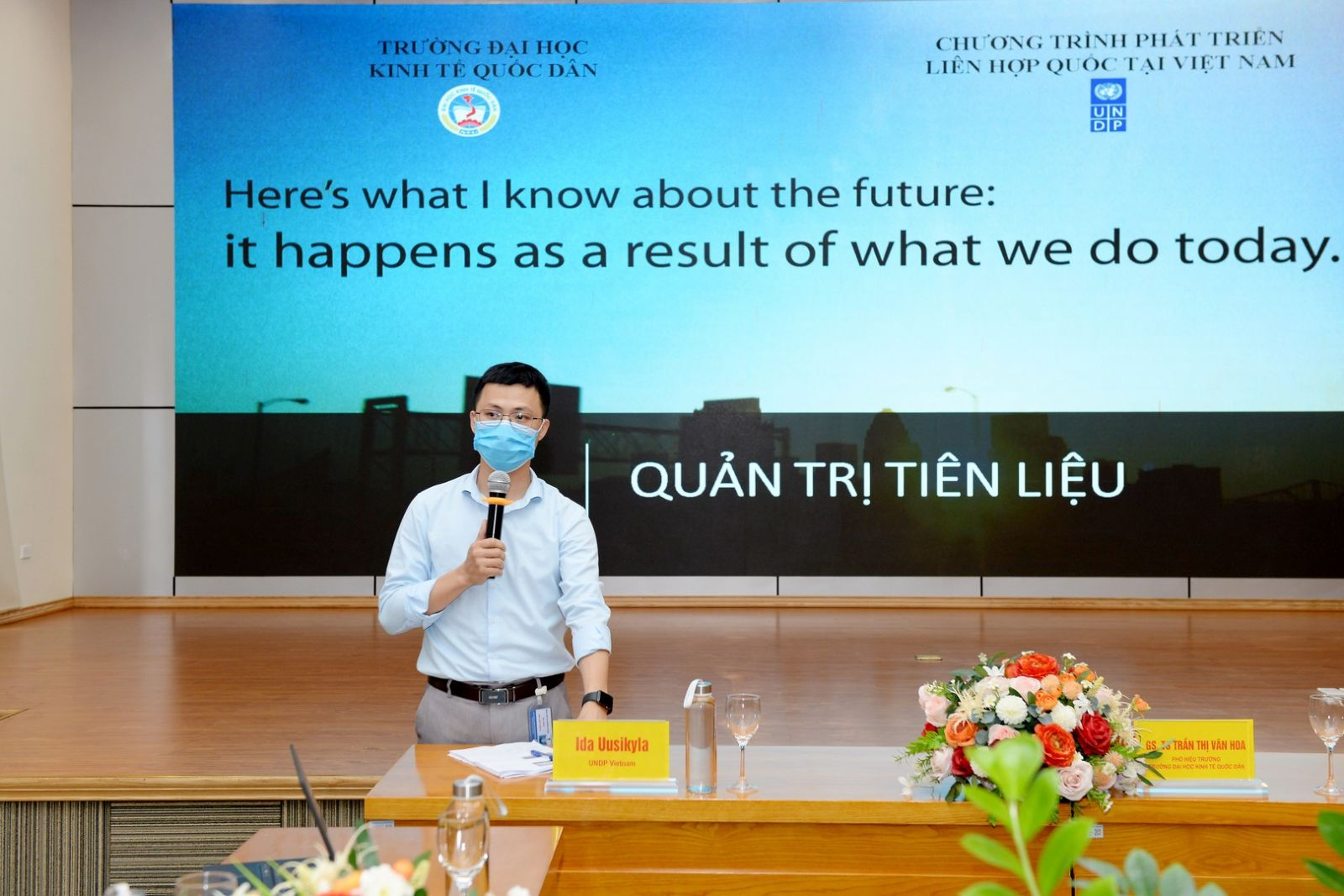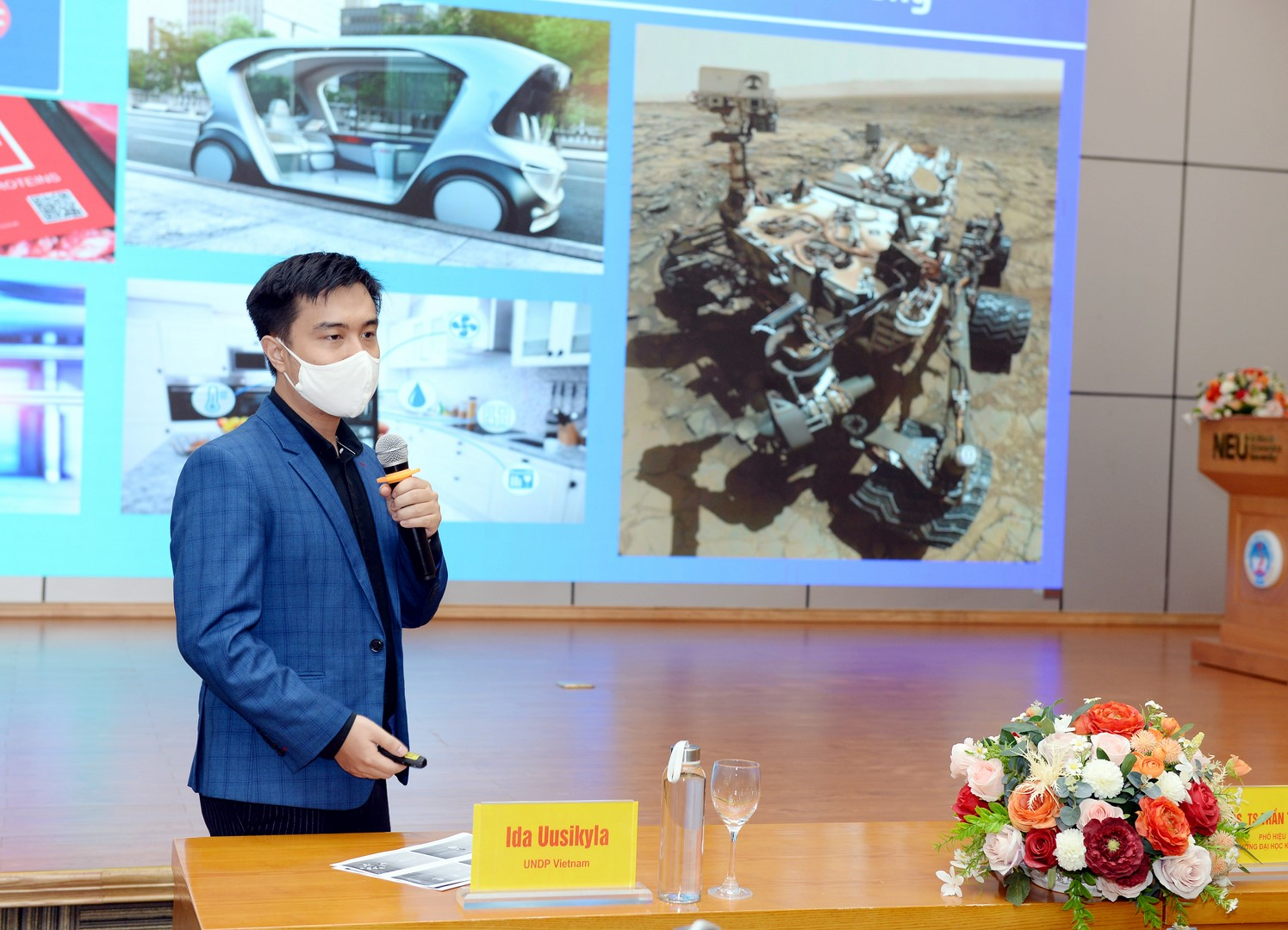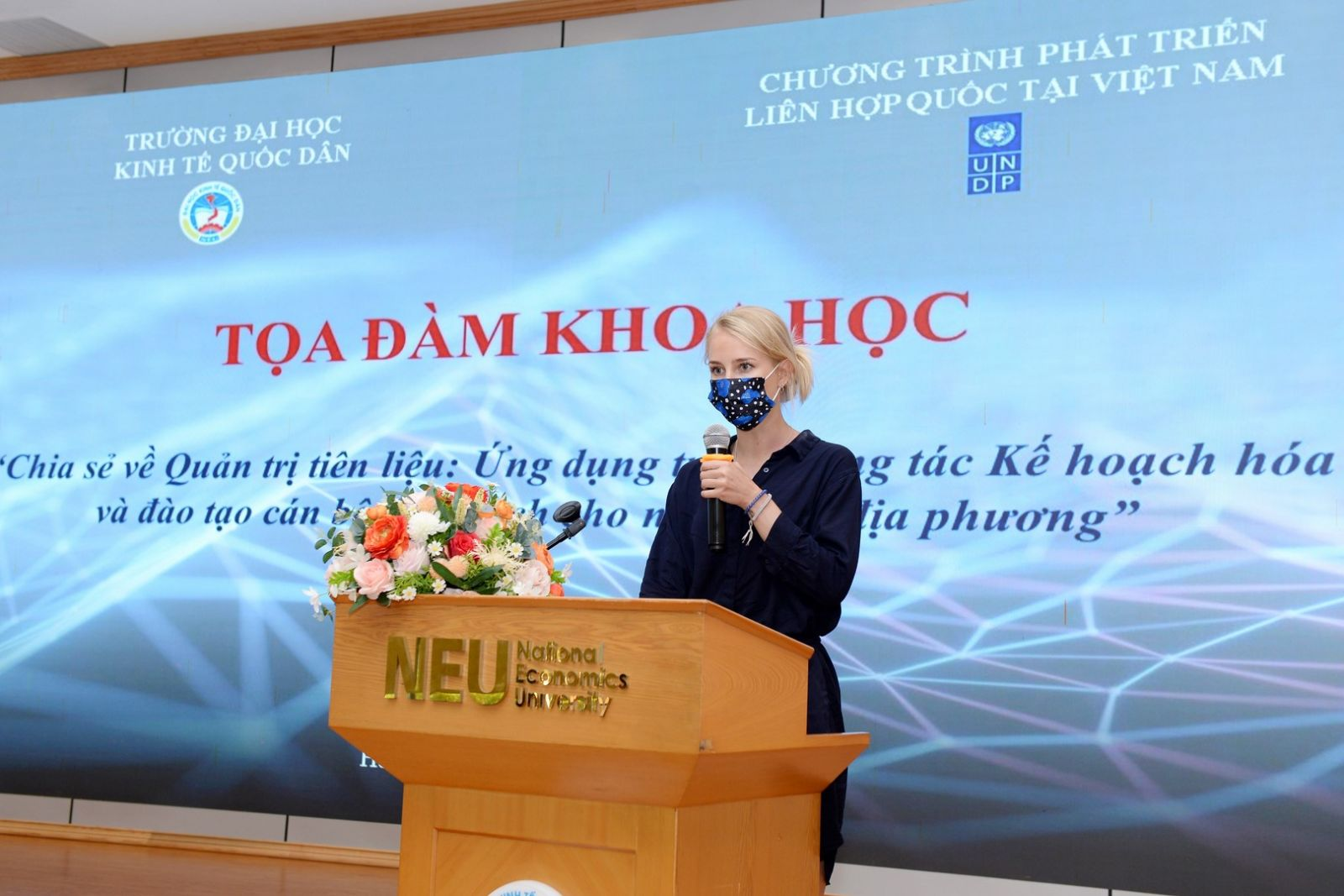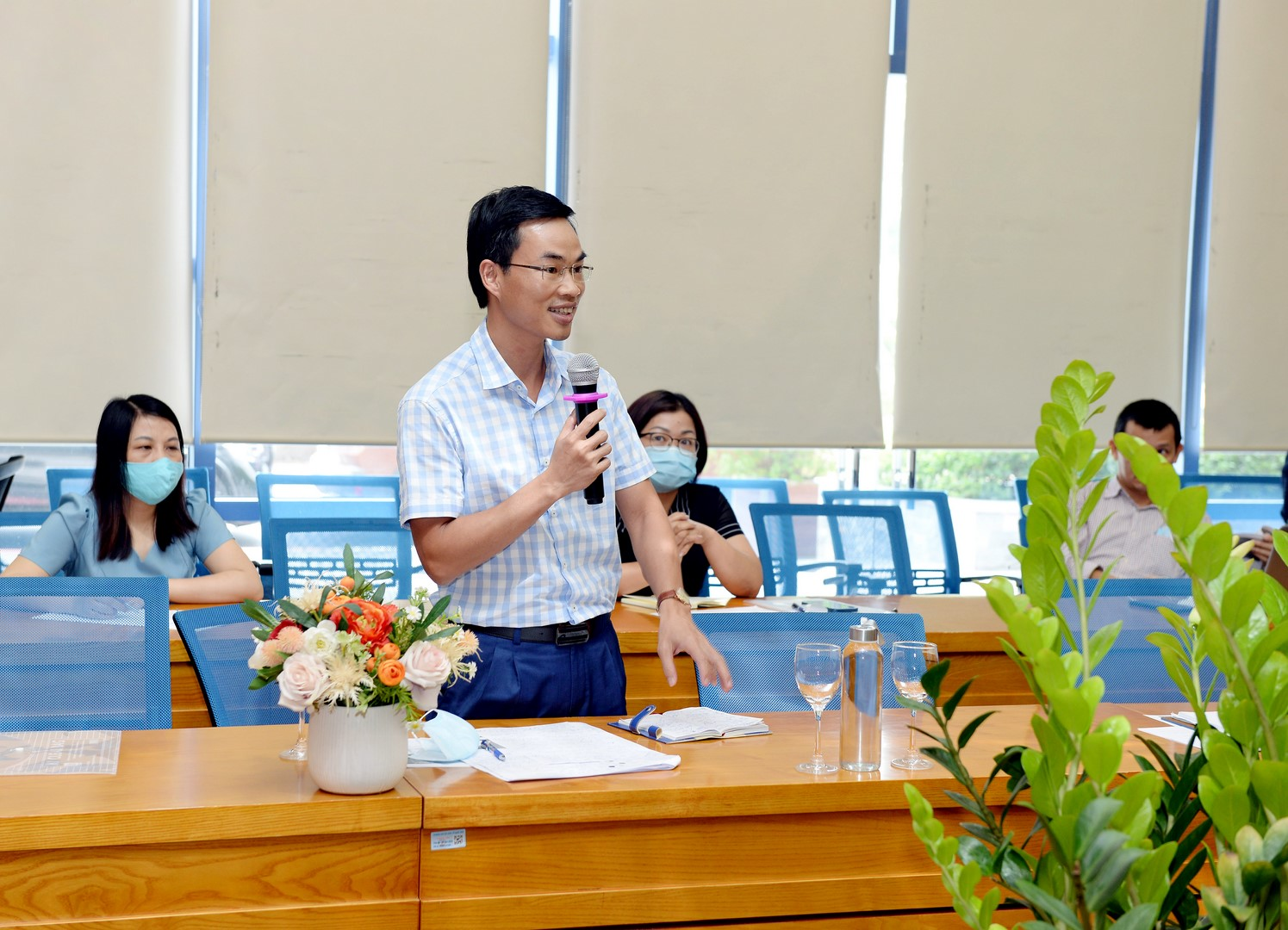According to Prof. Dr. Tran Thi Van Hoa, Anticipatory Governance is a new direction that the university would like to pursue.
The future economy is full of uncertainty and unknown elements. UNDP and the National Economics University are saying that Viet Nam needs to develop anticipatory governance to be better prepared for the future.
"We don't know what the future holds today" Deputy Prime Minister, Vu Duc Dam shared that at a conference on innovation in early 2021. How do we proactively adapt and act smartly before an uncertain future? According to UNDP and the National Economics University, Viet Nam’s government needs to develop Anticipatory Governance capability to be better able to navigate uncertainty and respond to landscapes of change. UNDP’s Resident Representative Caitlin Wiesen, has previously highlighted the need for Anticipatory, Adaptive and Agile Governance as the key to response to current COVID-19 and future crises.
Anticipatory Governance - planting seeds for the future
UNDP partnered with National Economics University (NEU) to start "sowing the seeds" of thinking about anticipatory governance. This is the leading economic training university in Vietnam, with more than 45,000 students currently enrolled. One of the oldest faculties born in the early days of the University's establishment, is the Faculty of Planning and Development, with the mission of equipping the students with knowledge on forecasting, planning and development management.
Prof. Dr. Tran Thi Van Hoa, Vice-President of NEU, said that anticipatory governance plays an important role in strategic planning of socio-economic development. In Vietnam, the theoretical background of planning and development has changed over time. In the context of fast globalization with many new factors, the forecasting science field must have a broader point of view than what is available now. Anticipatory governance, according to Prof. Dr. Tran Thi Van Hoa, is a new direction that NEU wishes to create in collaboration with international organizations such as UNDP to understand and gradually bring this subject into the core content of the training program of the Faculty of Planning and Development, aiming to provide the society with a talent pool of strategic foresighting experts.
How is anticipatory governance different from traditional forecast science? Assoc. Dr. Le Huy Duc, Faculty of Planning and Development, said that forecasting is a process based on past data, awareness of the rules that have been and will form to provide scenarios for the future. Forecasting is only one component of anticipatory governance. Anticipatory governance takes prediction as the basis, but opens the perspective through a foresighting process to develop multiple possible scenarios. By involving diverse stakeholders to integrate new and unusual factors, which helps to form possible scenarios, visions and future goals. Based on that, we find down and build the necessary factors and reciprocal actions to achieve desired results. In comparison with forecasting, anticipatory governance has a broader content, it is a management tool while forecasting is not. Forecasting only assumes the future, while anticipatory governance applies the forecasting results to plan and manage the future.
Assoc. Dr. Le Huy Duc said that forecasting only assumes the future, while anticipatory governance applies the forecasting results to plan and manage the future.
In other words, forecasting is based on current observable data to determine the future state, as a basis for making management decisions, while anticipatory governance is a collaborative process with the participation of Government, organizations, and people. This collaborative process aims to solve three major problems: discovering and envisioning the future; setting direction, developing strategic scenarios and experiment; innovating to achieve desired goals. In Viet Nam today, the research and mastery of anticipatory governance is very necessary. Firstly, it helps to change the management thinking from mainly "reactive management" to effective coordination and "anticipatory management". And more importantly, it equips managers with the tools to make policy and management decisions based on fully taking into account future changes in an uncertain and constantly evolving environment.
Connection is the key
As one of the first people to receive knowledge on anticipatory governance from UNDP, PhD. Ngo Quoc Dung shared that anticipatory governance allows us to gather collective intelligence to identify and respond to strategic risks and take advantage of new opportunities to meet development goals.
Anticipatory governance is a collaborative effort that depends on partnership, knowledge management systems, and communications. Accordingly, the connection is the key driving the meeting between forecasting with the changing of assumptions and the ability to adapt to a new future.
Anticipatory governance allows us to gather collective intelligence to identify and respond to strategic risks, PhD. Ngo Quoc Dung
The future can be many different scenarios, according to PhD Ngo Quoc Dung, anticipatory governance promotes searching for the future in three formats: expected future (the most likely future when business-as-usual continue); alternative future (the state in which something less expected happens); preferred future (the state in which something expected happens).
Future studies have been developing in the West for 40 years…
Humanity is at a great turning point in history when the revolution 4.0 brings outstanding utilities that people hardly imagined a few centuries ago. However, it is accompanied by global challenges, such as climate change, super viruses or the threat of cybersecurity ... It requires a country, an organization, or people to change the way they make a plan. It is very difficult to follow a linear plan and expect everything happens orderly from A-Z, because there are so many new factors that require greater flexibility and adaptability.
Mr. Nguyen Tuan Luong, Head of Solutions Mapping, UNDP said that in Western nations, Future studies has existed for about 40 years, stemming from the practical need of having planning method more suitable to complexity than simple statistical forecast, to solve the future problem with new unknown (a.k.a: Black Swan event) constantly appearing. Governments of many countries use strategic foresight in governance to shape the direction of development strategies and policies. In Finland, for example, strategic foresight plays an important role in shaping trade strategy of trade-mission led by Business Finland. In Singapore, they have a department to advise the Prime Minister on future trends, helping leaders to broaden their horizons and choose the path of development. ASEAN also has an ASEAN Foresight Alliance consisting of young scientists who jointly study and predict possible developments in the future …
Ms. Ida Uusikyla, UNDP Innovation Officer shared that UNDP hopes Viet Nam can apply anticipatory governance in economic foresighting activities. In the new context of the global economy, the Vietnamese Government has acted well and quickly in the prevention and control of the Covid-19 pandemic and kept the economy growing well. However, in order to develop sustainably in the future, Viet Nam needs a new approach to forecasting science, in conjunction with the traditional planning approach from the past.
According to UNDP experts, Viet Nam needs a new approach to forecast science.
Sharing UNDP's perspective, Prof. Dr. Ngo Thang Loi, Faculty of Planning and Development, said that development planning in Viet Nam is gradually shifting from planning based on available resources to strategic planning. It means we start with envisioning the future, and then come up with different scenarios to identify the actions that need to be done in the present. Anticipatory governance is completely in line with this innovation trend and provides great support for the development, selection and planning of action corresponding to the selected development scenarios.
Possible way to bring anticipatory governance into Vietnam
In Vietnam, Mr. Do Tien Thinh, Deputy Director of the National Innovation Center (NIC), said that government response in-line with anticipatory governance was implemented when our country was faced with a SARS epidemic (the year 2003) and now the Covid-19 epidemic. Where the development of multiple outbreak scenarios and corresponding action plan have helped Vietnam become safer and more proactive in pandemic prevention and control. This is a valuable practical lesson for anticipatory governance that has already existed in Vietnam.
According to Mr. Thinh, Viet Nam needs a new way of thinking about anticipatory governance, in order to help organizations and individuals have methods to detect risks early, identify trends, and future opportunities in an open and rapidly changing economic environment. Mr. Thinh supports the idea of anticipatory governance and considers it as a fitting topic to planning faculty and work. In particular, anticipatory governance takes advantage of the strengths of new technology, big data, and collective intelligence, to improve the accuracy of forecasts, while allowing testing, iterating to improve implementation.
Stemming from practical observations, anticipatory governance has been successful in some cases in Vietnam, Mr. Thinh suggested that the training program that UNDP and the National Economics University build with international knowledge should be shared and combined with practical stories in Vietnam. Besides, because this is a new topic to Vietnam, the training should be piloted within a specific application first, and then later scale up more broadly into planning work. “The Government, the Ministry of Planning and Investment are promoting innovation into the culture and action of localities and enterprises. If anticipatory governance can help to brings new knowledge and expand horizons in the planning process, then it will easily spread widely ”, Mr. Thinh suggested.
Mr. Do Tien Thinh, Deputy Director of the National Innovation Center (NIC), said that anticipatory governance was implemented when our country was faced with a SARS epidemic (the year 2003) and now the Covid-19 epidemic.
The scientific seminar on anticipatory governance held by UNDP in collaboration with the National Economics University on May 4, 2021 received many comments from delegates from government ministries such as National Forecast Center (Ministry of Planning and Investment), Ministry of Construction, Ministry of Agriculture and Rural Development, State Bank of Vietnam and some localities (Bac Ninh province). The majority of respondents said that anticipatory governance is not only planning, but also managing the process of implementing the plan. The governance factor is also a limited factor and must be further strengthened in the coming time.
Viet Nam is entering the first year of a new development era (2021-2030) with the ambition of developing the country to new heights. Many major economic indicators have been set such as the growth rate of the gross domestic product (GDP) averaging about 7% / year; GDP per capita at current prices by 2030 will reach about 7,500 USD; the urbanization rate will reach over 50%; the average total social investment reaches 33-35% of GDP; public debt does not exceed 60% of GDP ... The goal is very specific, but the path to the goal always has many new unpredictable factors. Therefore, experts and scientists agree that bringing anticipatory governance into the formulation and monitoring of the strategy implementation at all levels and sectors can help the economy develop a more proactive and stable future./.
---
*This article is written by Tuong Vi for the Economy and Forecast Review under the Ministry of Planning and Investment, translated by UNDP Accelerator Lab. The original article appeared first here

 Locations
Locations